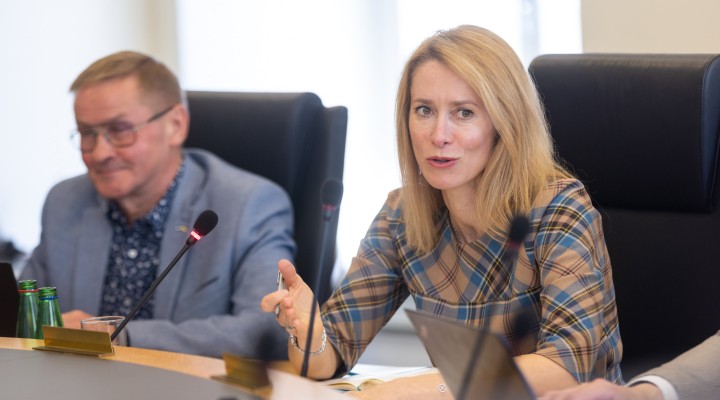“The goal of the green transition is to ensure people’s wellbeing whilst causing less harm to nature. This is a big goal that requires contributions from all sectors and all people. A good example is the circular economy, which needs to be developed as a matter of urgency – too little waste is sorted and recycled, whilst the availability of raw materials is decreasing. Developing the circular economy would be a win-win for consumers, the economy and the environment,” said Prime Minister Kaja Kallas.
Just transition in Ida-Viru County and prevention of socio-economic risks throughout Estonia
As the starting points of different municipalities in the green transition process are different, they also need different types of support to make the transition a success. In order to reduce the risk of an increase in inequality, the group recommends that additional efforts and resources should be directed towards developing attractive living environments in places where qualified and affluent people haven’t wanted to settle so far.
It is recommended that lower-income families, who are currently not eligible for loans from banks, should be able to benefit from investments that would help them make cleaner transport choices and reduce their energy and heating bills, as energy costs and the overall livelihoods of people are of key importance.
According to Minister of Public Administration Jaak Aab, almost €67 million will be channelled from the Just Transition Fund specifically into making Ida-Viru County an attractive place to live. “This is a good start for change in the longer term, as it will directly support investment in social and health services that promote social change, as well as the respective regional initiatives and the activities of local authorities,” said Aab. “There is a lot of work to be done, and the tools for a just transition are the start of the journey,” the Minister said.
Ida-Viru County needs a clearer timeframe and roadmap for exiting oil shale, experts say. Flexible retraining and upskilling for the workforce leaving the oil shale industry and support for local entrepreneurship is needed. “The smooth transition of Ida-Viru County to a more diversified economy requires a much broader effort than the Just Transition Fund calls for, as competition for investment between European regions with a fossil heritage is very high. Given the current security situation, finding resources for Ida-Viru County is critical,” emphasised Marti Hääl, representative of the expert group and member of the management board of the Alexela Group.
Supporting research-intensive green economy and circular economy
In order to stimulate the green economy and circular economy, experts propose to significantly improve access to funding for both large and small businesses, facilitate investment in green technologies and help bring local solutions to the market.
“Estonia has great potential for developing and testing new circular products and business models, as the necessary start-up ecosystem is already in place here. There are also companies in Estonia that have proven themselves internationally, for example in the sharing economy. Government support for them should be continued and expanded, both in terms of the legal framework, the tax environment and the reduction of red tape, as well as financially,” explained leader of the Green Tiger Platform and member of the expert group Eva Truuverk.
Increasing resource productivity should preferably focus on material valorisation solutions in high-impact economic sectors such as oil shale, construction, timber.
Minister of Entrepreneurship and Information Technology Andres Sutt said that funding is crucial for the development of green technologies in Estonia. “Whilst research, development and resource valorisation have been priorities in several development plans in the area of green policy, funding for related activities has been modest. Compared to IT, for example, green technologies are much more capital and development intensive and therefore require higher investments,” explained Sutt. According to Sutt, the first steps have been taken by the state to encourage green investment. “Today, one of the most important research and development activities for companies is the applied research programme with a focus on green technologies. Applied research provides companies with important input for creating and implementing innovative technologies and solutions. In addition, the €100 million SmartCap Green Fund will start investing this year, providing funding to companies at different stages of development that create new products or services based on green technologies. This will be boosted further by an even larger amount of private capital,” added Sutt.
In order to improve waste recycling, the authors of the report recommend that the responsibility of municipalities should be defined, and they should be motivated to organise efficient waste management. The responsibility of producers in the packaging collection and recovery system must also be increased.
“We’re proposing a series of measures to enable both businesses and individuals to participate in meeting Estonia’s climate targets and to make informed choices. They could help raise awareness through the education system, train more environmentally knowledgeable professionals, make environmental reporting easier for businesses and provide them with more advice on how to implement activities related to the green transition,” said the Vice-Rector for Green Transition at the Tallinn University of Technology Helen Sooväli-Sepping. Businesses, umbrella organisations, universities and the public sector should work together to develop green transition roadmaps for different sectors, providing certainty for businesses and investors alike and pointing the way forward for the development of the new technologies needed.
The Ministry of the Environment, the Ministry of Economic Affairs and Communications and the Ministry of Education and Research will analyse the proposals put forward by the expert group and present their action plan to the government in June. The expert group will continue to present its proposals to government members on 1 June.
Read more about the proposals of the expert group here https://www.valitsus.ee/media/4870/download
During its previous session the green policy steering committee presented its recommendations on mobility and spatial planning: https://www.valitsus.ee/uudised/rohekomisjon-tutvus-ettepanekutega-tarkadeks-valikuteks-liikuvuses-ja-ruumiplaneerimises
A discussion of energy recommendations took place on 18 March https://www.valitsus.ee/uudised/rohepoliitika-eksperdid-julgeolekukriisis-meie-kohustus-kiirendada-rohepooret
Members of the expert group: https://www.valitsus.ee/uudised/tana-sai-kinnitatud-rohepoliitika-eksperdiruhma-koosseis
Gallery: https://flic.kr/s/aHBqjzR94j
